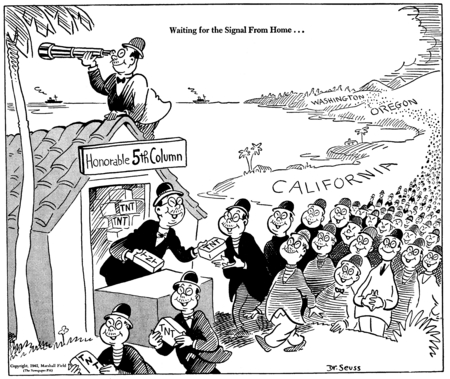
[Waiting for the Signal From Home . . . 1942, UC San Diego Library.]
Short Term Impact
Throughout history, communicating by political cartoons has been a key to
success in communication. As stated by Chris Lamb, there is a “distinctive
role that [political] cartooning plays in chronicling history as it happens…
cartoonists give us critical often-brutal interpretations of the day’s issues
and events.” Dr. Seuss drew his political cartoons with these
aspects. Seuss was one of the best cartoonists of his time because he
communicated his points with great fervor. He
made his mark in the fight against isolationism and America First,
and changed people’s minds about going into war.
One negative point of Dr. Seuss’ political cartoons is Seuss’ Japanese
stereotype. His Japanese stereotype, drawn as a slant-eyed pig-nosed
caricature, depicted the Japanese in all of Seuss’ cartoons. According to
Josh Hafner, Dr. Seuss fell victim to the same racism he fought. He
supported the Japanese internment in his cartoons. Seuss’ later work,
Horton Hears a Who, is seen as an apology for the Japanese caricature.

[Waiting for the Signal From Home . . . 1942, UC San Diego Library.]